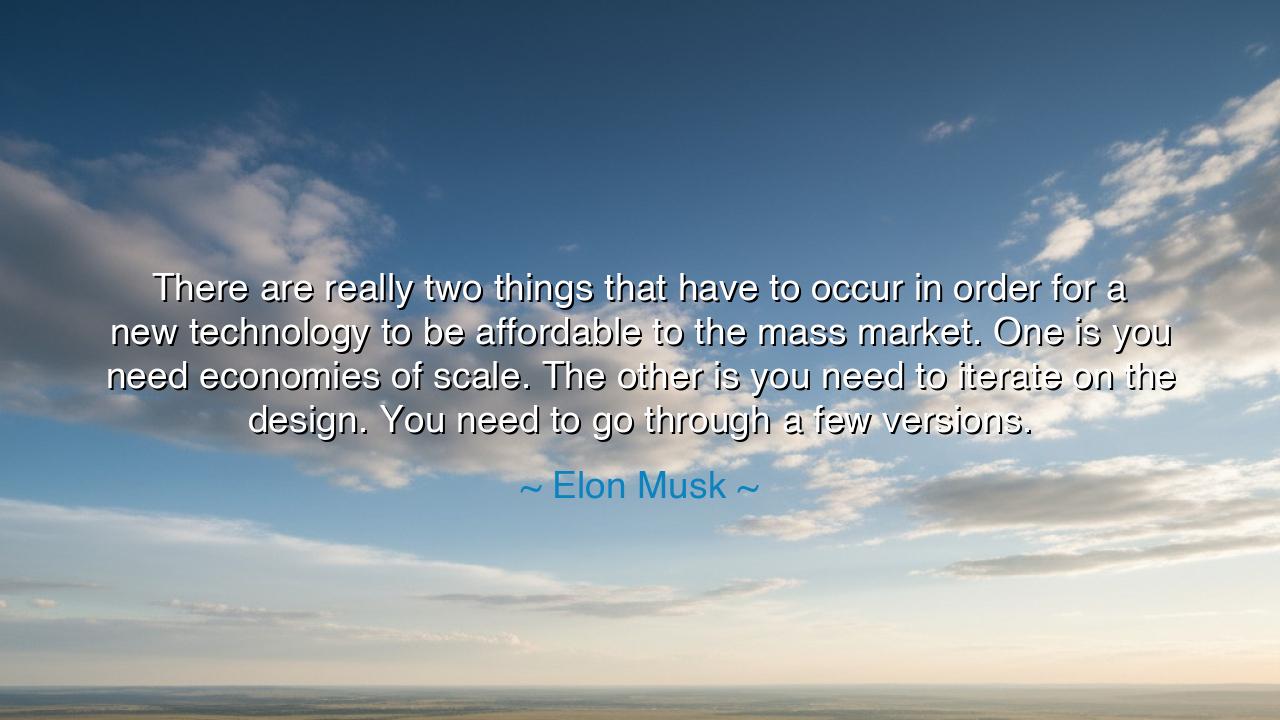
There are really two things that have to occur in order for a
There are really two things that have to occur in order for a new technology to be affordable to the mass market. One is you need economies of scale. The other is you need to iterate on the design. You need to go through a few versions.






Hear now the words of Elon Musk, who spoke with the clarity of a craftsman and the boldness of a pioneer: “There are really two things that have to occur in order for a new technology to be affordable to the mass market. One is you need economies of scale. The other is you need to iterate on the design. You need to go through a few versions.” This is no idle statement, but a distillation of the eternal law of creation: nothing great is born perfect, and nothing wondrous reaches the people until it has been tested, refined, and multiplied for all.
The ancients too knew this law. When the first ships were carved from timber, they were small, fragile, and unfit for the wide sea. But through iteration, each generation of builders learned—making stronger hulls, sturdier sails, sharper keels. And when at last the scale of fleets grew, men could cross oceans, binding distant continents into one world. Thus, Musk’s words echo not just of modern machines, but of truths as old as human endeavor: that invention requires both patience in crafting versions, and wisdom in multiplying the fruits of success.
To speak of economies of scale is to speak of the power of numbers. One tool is precious and rare; a thousand tools can serve a people. When Henry Ford brought forth the Model T, he did not merely create a car; he mastered the art of producing many cars, each one more affordable than the last. By doing so, he transformed the carriage of the few into the vehicle of the many, reshaping cities and lives. This is the first half of Musk’s law: a vision may be born in the hands of the inventor, but only scale can place it in the hands of the world.
Yet scale alone is not enough. Without the spirit of iteration, the product remains crude, flawed, and costly. Musk speaks of “a few versions,” but the wise know that behind each version lies sweat, error, and the courage to try again. The Wright brothers’ first planes stumbled and crashed; Edison’s bulbs failed a thousand times before one shone. And yet, by embracing failure as teacher, they forged designs worthy of endurance. Thus, iteration is the hammer that strikes away weakness, leaving behind only strength.
Consider the path of Musk himself. His electric cars, once mocked as toys, were born in struggle. The first versions were expensive, limited, and fraught with doubt. But through relentless iteration, improvements in batteries, engines, and design came forth. And as factories grew, economies of scale were harnessed, and the dream of the electric car became not a luxury for the few, but a hope for the many. In this we see the living truth of his words: that greatness is forged step by step, version by version, until it belongs not to one man but to the world.
The lesson, children of the future, is clear: do not despair if your first attempt falters, nor believe that perfection is demanded from the beginning. All things worthy must pass through the fire of iteration. And when you succeed, do not hoard the fruit of your labor, but seek to expand, to share, to bring it within reach of the multitude. True greatness lies not in crafting a single jewel, but in filling the marketplace with light so that every home may shine.
Practical actions await you: in your craft, whether humble or mighty, create your first version and dare to release it. Learn from its flaws, refine it, and then create again. Do not fear repetition, for it is the ladder by which you climb. And when your work is strong, labor to expand it, to produce enough that it serves not only yourself, but your people, your nation, and beyond. Remember always: iteration brings strength, and scale brings impact.
Thus, let Musk’s words stand as a beacon: the path to affordable, life-changing technology is not the sudden leap of genius alone, but the steady march of patience, refinement, and expansion. Follow this law, and you too may create not just for the few, but for the many, leaving behind not a fleeting wonder, but a legacy that endures.






AAdministratorAdministrator
Welcome, honored guests. Please leave a comment, we will respond soon